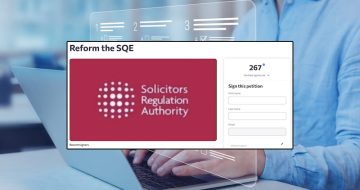Former Home Sec slammed students calling for exam overhaul

The trainee solicitor behind a petition calling for an overhaul of the “disproportionately challenging” Solicitors Qualifying Examination (SQE) has hit back at lawyer-turned-politician Suella Braverman KC, after she claimed in a national newspaper that those signing it had a “snowflake sensibility”.
For Legal Cheek readers who haven’t been following the story, we first reported late last week that someone purporting to be a trainee at an international law firm had launched a petition calling for reform of the SQE.
In it, they argue the new exams are “not fit for purpose” and claim they discriminate against candidates from diverse backgrounds and those with different learning styles. The trainee also described how the SQE had taken a serious toll on their mental, financial, and physical wellbeing. The petition has since attracted nearly 900 signatures.
One person we can safely assume hasn’t signed the petition is former Home Secretary Suella Braverman, who — much to our surprise — took to the pages of The Telegraph to voice her displeasure.
“A cohort of aspiring solicitors has taken to petitioning for the SQE to be made easier,” she writes. “Their complaint? The exams are ‘too hard, disproportionately challenging’, and, of course, ‘biased towards certain backgrounds and learning styles’. In other words: ‘We didn’t do well, and it must be someone else’s fault.’”
The former Cambridge-educated barrister goes on to argue that the “snowflake sensibility — once confined to undergraduate common rooms and the wilder fringes of social media — has now infected even the corridors of legal ambition”.
Well, the rookie solicitor who launched the petition has now responded to Braverman’s comments in a brief update posted on the Change.org website.
“Nowhere in the petition did I claim that the exam was ‘too hard’,” they say. “I’m not a wet lettuce, for Christ’s sake.” Doubling down on their argument that the SQE is “disproportionately challenging”, they urged the Conservative MP to “don your reading spectacles and place your thinking cap firmly on and re-read [the petition].”
They go on to list what they describe as the key issues currently affecting the SQE and the students expected to pass it — many of which are already highlighted in the original petition.
These include the “extortionate” cost of sitting the exams, the lack of past papers, reports of candidates allegedly being “denied access [to] water during the exam,” and concerns that the questions do not reflect real-life legal practice.
“I am somewhat disappointed that a KC could not identify the more nuanced points made within the petition,” they write. “However, I guess that comes with the territory of using the penniless youth trying hard to succeed in your political point scoring,” before the trainee signs off, “Yours sincerely, A snowflake x.”
In response to the petition, a spokesperson for the SRA previously said: “We understand that candidates can find the SQE challenging, both to prepare for and sit. It is a demanding, high stakes assessment that gives successful candidates access to a licence to practise.”
They continued:
“The questions are written by a pool of solicitors reflecting what is expected of a newly qualified solicitor and the pass mark is determined using well-established methods. The SQE’s independent reviewer has confirmed it’s a robust and fair assessment. Many candidates have now passed the SQE. Pass rates and statistical information about candidates are published after each sitting. Differential outcomes by ethnicity are widely seen in legal professional exams, in other sectors and at different stages of education. Informed by research commissioned from the University of Exeter, we are taking action to address the causes of such differential outcomes that are within our influence.”


